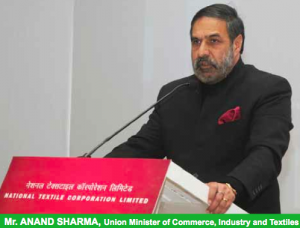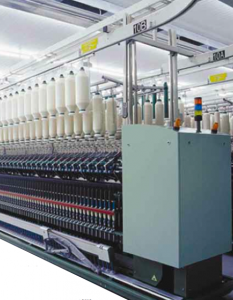
The Union Minister of Commerce, Industry and Textiles, Mr. Anand Sharma, has exhorted the textiles industry to improve its competitiveness at the global stage.
Speaking at the Parliamentary Consultative Committee on Textiles, Mr. Sharma said: ìBesides nurturing what we have, it is essential to remain globally competitive. Increasing employability and staying competitive are the key objective for us.
The committee discussed the Integrated Skill Development Scheme (ISDS) and the Scheme for Integrated Textiles Parks (SITP).
The Minister informed the members that the Indian textiles industry has an overwhelming presence in the economic life of the country. The sector contributes 14 per cent of industrial production, four per cent of GDP and 10.63 per cent of the countryís export earnings. It provides direct employment to over 35 million people, which includes a substantial number of SC/ST and women. The sector is the second largest provider of employment after agriculture.
Allocation for textiles under the 11th Plan was Rs. 14,000 crores, which was enhanced by Rs. 5,000 crores to Rs. 19,000 crores. The Government has formulated the National Fibre Policy to provide a holistic boost to the development of the sector.
On the Integrated Skill Development Scheme (ISDS), the Minister explained that the focus is on creation of a large variety of skills, from basic to specialized, to meet the needs of the industry. Textiles, being the second largest employment generating sector, requires a diversified portfolio of skills both across sub-sectors and processes. Skill creation under this sector is therefore strongly linked to quality standards and competitiveness, especially in export markets.
As on date, 18 institutions are being funded under the first component and 12 organizations have been selected under the second. The Ministry is developing a skill exchange portal and an MIS portal. These portals will help improve scheme implementation. Under the scheme projects amounting to Rs. 423 crores for component I and Rs. 60 crores for component II approved. Against the target of 2.5 lakh textiles workers to be trained, a target of 1.5 lakh workers would be achieved by March next.
 Referring to SITPs, the Minister said that in the 11th Plan 40 such parks were sanctioned, with a financial allocation of Rs. 1,400 crores. Of these, seven parks have been completed, 14 parks have drawn 90 per cent of grants, and 15 parks are in progress. The Government sanctioned 21 new parks in October last to generate Rs. 9,000 crores worth of investment in the textile sector and create employment for four lakh workers.
Referring to SITPs, the Minister said that in the 11th Plan 40 such parks were sanctioned, with a financial allocation of Rs. 1,400 crores. Of these, seven parks have been completed, 14 parks have drawn 90 per cent of grants, and 15 parks are in progress. The Government sanctioned 21 new parks in October last to generate Rs. 9,000 crores worth of investment in the textile sector and create employment for four lakh workers.
The SITP scheme has attracted international attention and the Prime Minister has announced setting up of an Integrated Textile Park in Africa at an outlay of Rs. 350 crores under the India Africa Forum Summit II Declaration.
The Minister also referred to the recently approved packages for weavers.
Mr. Mahendra Kumar Roy of Jalpaiguri raised the issues pertaining to the jute sector and asked the Government to look into the problems of jute growers and mill workers.
Mr. P. Vishwanath raised the issue of the Kancheepuram textiles industry, while Mr. Kanjibhai Patel sought details about the PPP component of the ISDS scheme and the criteria of selection of SITPs.
The Minister of State, Ms. Panabaka Lakshmi, and the Secretary (Textiles), Ms. Rita Menon, were also present along with senior officers and key stakeholders.